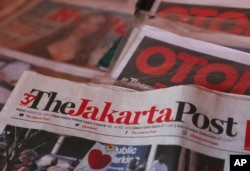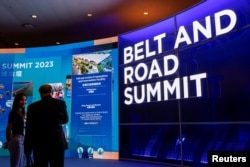From all-expenses paid trips to cover China's Belt and Road summit to content-sharing agreements with major media outlets, Beijing is investing in ways to share its narrative with Indonesian audiences, analysts say.
One of the biggest deals came in November, when the Indonesian network Metro TV signed an agreement with China Media Group to expand content for Metro TV's flagship Mandarin-language news program, "Metro XinWen."
The broadcaster joins the ranks of The Jakarta Post, which reposts content from the China Daily, and Indonesia's news agency, Antara, which has a similar partnership with the Chinese agency Xinhua and CGTN.
The content-sharing or content-generating agreements are a continuation of methods Beijing has been using for years in Indonesia.
A 2022 Freedom House report found China uses those two tactics, along with censorship, to shape narratives.
Freedom House "found that several Indonesian media that have signed cooperation agreements with Chinese media have been trying to avoid any negative criticism towards China," said Muhammad Zulfikar Rakhmat, a co-author of the 2022 report.
Zulfikar, who is director of China-Indonesia-Middle Eastern Studies at Indonesia's Center of Economic and Law Studies, said some Indonesian outlets fail to properly attribute stories taken from China's state-owned media.
"This causes audiences to perceive the article was written by a local media and not sourced from a foreign media company," he said.
Experts told VOA the deals can seem useful at a time when the media industry is in economic decline. And, while there are cases of reporters producing more favorable coverage after participating in Beijing-paid trips, local media experts say Indonesia has a robust editorial policy to maintain its independence in reporting.
Taufiqurrahman, who is editor in chief of The Jakarta Post, told VOA, "Any collaboration with China Daily is purely commercial in nature."
"It's simply that China Daily buys space for ads for its content, something we always put disclaimer on. No editorial collaboration has taken place, it's simply China Daily using our space as (an) advertisement and we treat it as such," said Taufiqurrahman.
Like many Indonesians, Taufiqurrahman uses only one name.
Metro TV did not respond to VOA's request for comment. Antara said it could not divulge the details of their contract with Xinhua due to legal concerns.
VOA asked the Chinese Embassy in Jakarta for comment, but they declined to respond.
Beijing also invites media on trips, which analysts say is an attempt to promote favorable coverage.
In September, China's Information Services Department paid for 15 journalists including reporters from South Korea, Thailand, Indonesia, Poland and Hungary to cover its Belt and Road summit held in Hong Kong, according to reports.
And in December, according to the news website Kompas.com, China invited journalists from Indonesia to Shenzhen for the first time.
China's efforts to spread its influence are not always successful, experts say.
When China sent Indonesian journalists to Xinjiang to visit Uyghur Muslim camps in 2019, most reporters were positive about their trip in later coverage. But others wrote critical stories.
Some experts, however, say that editorial independence prevents too much interference.
Zulfikar noted that papers do not promote Beijing's narratives that challenge Indonesia's national interest such as its opposition to China's claims to the South China Sea.
And Christine Tjhin, an expert in China-Indonesia relations at the consultancy firm the Gentala Institute, told VOA that even with news-sharing agreements, she doubts that China has "direct control" over local media's editorial policy.
"I see diverse content on China on Indonesia media, from positive to very critical," she said.
However, Indonesian media companies have become more open to foreign investments as revenue declines.
Christine said some Indonesian media have long been searching for investors from China. Based on May 2020 data from the Press Companies Union, more than 70 percent of the 434 media companies surveyed saw revenue drop. That's a 40 percent decrease compared to the previous year.
Zulfikar echoed that saying, "I did an interview in July with leading figures of well-known Indonesian media. … They mentioned that it's good money."
The economic situation is a factor, said Zulfikar.
"I think China understands as well that the role of traditional media is declining in Indonesia. Nobody reads printed newspapers anymore. They are online now and many people prefer to watch YouTube, using their social media," he said.
Wahyu Dhyatmika, chair of the Association for Indonesian Media Cyber or AMSI, said the country has a robust press freedom community.
Laws limit foreign ownership, reducing the potential of Chinese state media to take control of local media outlets, Wahyu told VOA in a telephone interview. Investors who attempt to intervene in local editorial decisions can also face criminal charges for violating media laws.
"I don't deny that there are (Chinese) investors who attempt to place media advertorials (in local media), so it's important for publishers to affirm their independence and investment guidelines," said Wahyu, a 2014 Harvard University Neiman fellow.
Indonesia in global press freedom rankings has made progress. It ranks 108 out of 180 countries on the world index, where one represents the best media environment. In 2023, it saw a nine-point improvement from the previous year.
This story originated in VOA's Indonesian service.






